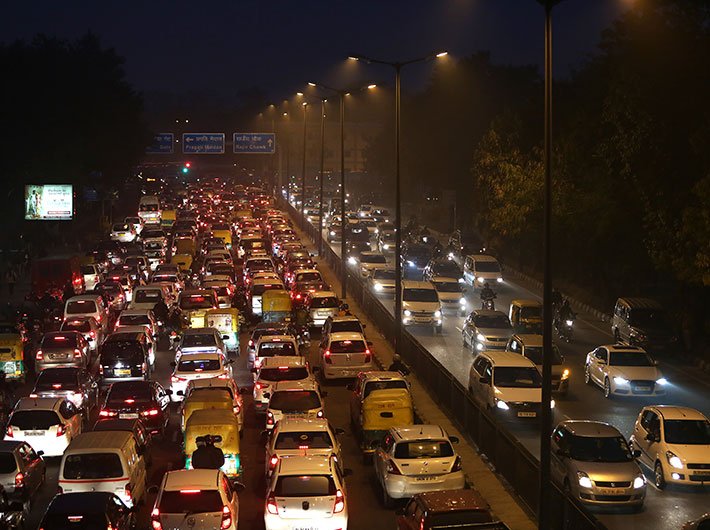The year 2016 begins with an experiment, quite odd though, literally as well as in terms of what it aims to achieve through a formula that intends to keep half of the private cars off the road in Delhi, at least till January 15.
The intent is good, but the approach is more of a kneejerk, quite symptomatic of the ‘experimental governance’ model that is slowly becoming the order. Strangely, the Aam Aadmi Party, that sought citizens’ views on all aspect of its decision making – from drafting election manifesto to identifying constituency-level needs for budget preparation – did not think it right to seek their view before announcing this surgical measure.
The odd-even plan has drawn people into a massive debate – whether the city has adequate public transport system to handle the additional load effectively, the practicality of the formula and other options, as well as whether what has worked in Beijing, Mexico, Bagota, Lagos or Singapore can work in Delhi.
The point that has not been discussed, however, and perhaps not been considered by the Delhi government is whether the existing system can be streamlined and better implemented to achieve the same result, without the drastic ‘back-to-the wall’ measure.
Or has Delhi exhausted all options?
With the pollution under control (PUC) certification being made mandatory for all vehicles in Delhi, post supreme court order in 2000, and the more recent national green tribunal order banning diesel and petrol cars older than 10 years and 15 years respectively, one would assume that vehicular pollution would soon be brought under control. After all, one would believe that if the government is able to ensure that polluting vehicles are off the road, the cancerous ‘cell’ of air pollution in Delhi have not just been quarantined, but also deleted.
READ: All you need to know about odd-even formula in Delhi
In fact, more than a year ago the Delhi government had announced that from December 1, 2014 petrol pumps would refuel only those vehicles that have PUC certificates. The reason, according to the then state chief secretary DM Spolia, was that out of over 82 lakh vehicles registered in the national capital, only 33 percent vehicles (in 2014) had valid PUC certificates. However, the move was shelved after protest by the petrol pump owners cited security reasons.
Incidentally, Delhi has already shifted to Euro-IV fuel, which also means that it follows the global clean fuel standards. Combine this with strict inspection for PUC and annual health certification of vehicles and we can easily achieve a drastic reduction in vehicular bad breath. This can also be strengthened by roadside spot checks as in Israel or in Hong Kong, with heavy penalty for non-compliant vehicle owners.
Besides, technology allows the transport department to keep tab on the validity of PUC certificate of each vehicle, as also to send alert for renewal of certificate and periodic vehicular health check-up. A failure to do so, as would get reflected through the database, can automatically lead to issuing of a warning letter (or SMS) and then grounding notice of the vehicle, till clearance by the authority.
Let us look at another reason that increases vehicular pollution by over 50 percent. Research has shown that efficient traffic management can improve the vehicle flow on the roads and reduce vehicular emission drastically. The rationale is simple: vehicular emission (and hence pollution) is caused by idling, accelerating, cruising and decelerating due to certain road conditions, and if these conditions are better managed, then it can lead to reduction of emission itself.
On good days, my 12-km drive between home and office takes around 17 minutes. However, on most other days, I end up spending over 45 minutes one way. This means my car is idling, accelerating or decelerating for close to an extra hour each day. This also means extra emission for the period that my car is on road, more than double my optimum travel time.
The prime reason for this delay is the congestion on road caused by bad driving behaviour, traffic rule violations including non-compliance of lane driving, police barricades and road encroachment. All these choke the roads. In fact, at times a barricade on an encroached road itself leads to more than double the travel time. A better managed road and smooth traffic flow can reduce the time spent by a vehicle on road by over 50 percent.
According to a study conducted by the Center on Economic Competitiveness at the University of California, Berkeley, speed management along with congestion mitigation strategies can help reduce CO2 emissions by approximately 30 percent. Add to this the other pollutants, including the rising loose soil and dust on the roads due to vehicular movement, and over 50 percent reduction in pollution caused by automobiles can easily be achieved.
shubhendu@governancenow.com
(The article appears in the January 1-15, 2016 issue)

